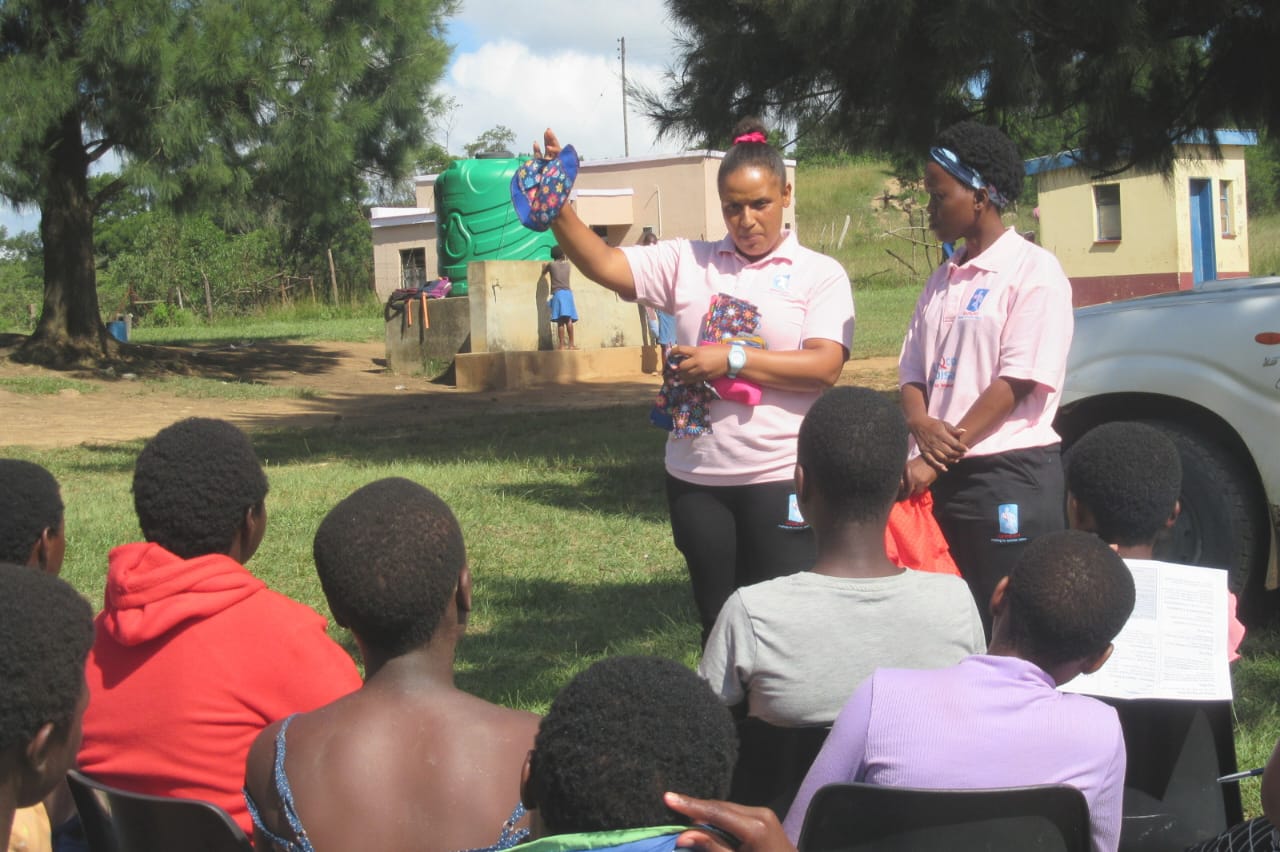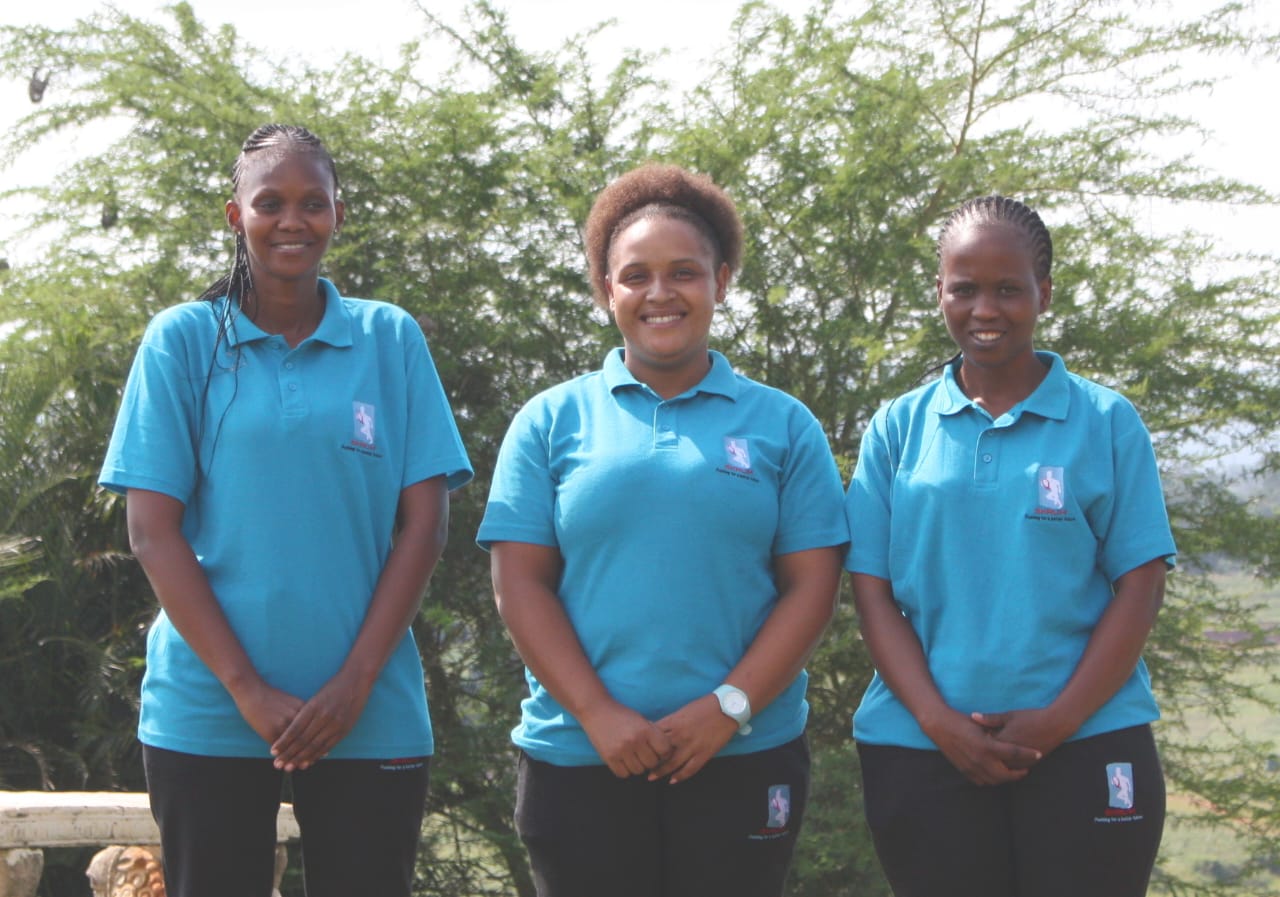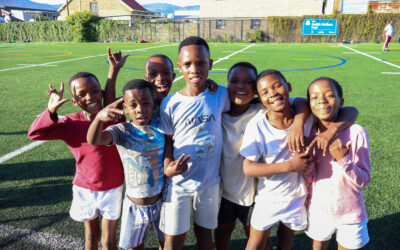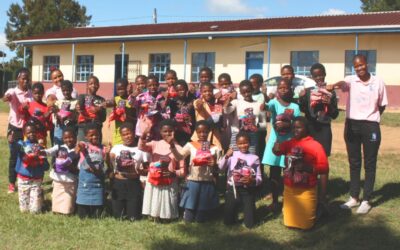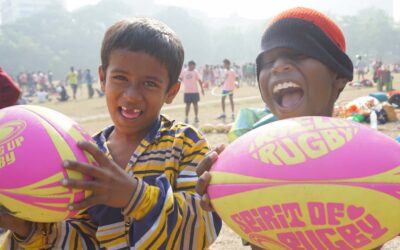Eswatini, a small landlocked nation in Southern Africa, faces significant challenges when it comes to sexual and reproductive health education, particularly for young girls and women. Deep-rooted cultural taboos and inadequate access to information contribute to widespread stigma around menstruation and limited understanding of sexual health.
Responding to this issue, our incredible project partner, SKRUM, has launched the much-anticipated Umbhoco weNgabisa sessions, bringing essential education and resources to young girls in Eswatini. These sessions go beyond the rugby pitch, delivering vital lessons on menstrual health and hygiene, lessons on how to use reusable sanitary products and a bag of reusable sanitary products to take away with them. These sessions empower girls to take control of their well-being and break down long-standing stigmas around periods.
During the latest session, 24 young girls were taught about the importance of reusable sanitary pads—how to use, clean, and maintain them. This knowledge not only equips them with practical skills but also empowers them to navigate their menstrual health with confidence and dignity. Each participant left not just with essential knowledge but also with a bag filled with reusable sanitary pads and healthcare items, ensuring that no girl has to miss school or face unnecessary challenges due to a lack of menstrual products.
Menstrual Stigma and Lack of Education
In Eswatini, menstruation is often viewed as a taboo subject, shrouded in secrecy and silence. Many young girls grow up with limited knowledge about their own reproductive health, resulting in misinformation, fear, and embarrassment. This lack of education perpetuates harmful myths and misconceptions about menstruation, leaving girls unprepared for their periods and unaware of how to manage them safely.
Impact on Education and Well-being
Due societal stigma, many girls face barriers to attending school during their menstrual cycles. Without access to adequate sanitary products, some girls miss up to 20% of the school year or drop out entirely. This absenteeism not only affects their education but also limits their future opportunities, perpetuating cycles of poverty and inequality.
Teenage Pregnancy and HIV
Eswatini has one of the highest HIV prevalence rates in the world, with approximately 27% of adults aged 15-49 living with HIV. Young girls are disproportionately affected, often due to a lack of comprehensive sexual health education and limited knowledge about contraception and safe practices. According to UNICEF, 1 in 3 girls in Eswatini becomes pregnant before the age of 18, further limiting their access to education and opportunities.
The absence of open conversations about sexual health leaves girls vulnerable to exploitation, unsafe practices, and gender-based violence. Many girls enter adulthood with little understanding of their rights, reproductive choices, or how to protect themselves from sexually transmitted infections (STIs), perpetuating cycles of disempowerment.
Menstrual Products and Resources
Poverty compounds the problem, with many families unable to afford sanitary products. As a result, some girls resort to using unsafe alternatives such as cloth, newspapers, or leaves, increasing the risk of infection and other health complications. Reusable sanitary pads, like those provided through SKRUM’s Umbhoco weNgabisa sessions, offer a sustainable and affordable solution, but there remains a critical need for greater access and education across the country.
Education and Empowerment
Initiatives like the Umbhoco weNgabisa programme are critical in addressing these challenges by providing girls with knowledge, resources, and safe spaces to discuss their health. By combining menstrual education with sport and mentorship, SKRUM and The Atlas Foundation are helping to break the silence, dismantle harmful taboos, and empower young girls to take control of their futures.
The Way Forward
To create lasting change, ongoing efforts must focus on:
-
Expanding access to sexual health education in schools.
-
Providing affordable and sustainable menstrual products.
-
Engaging communities to challenge harmful cultural norms and promote open dialogue.
By addressing these critical gaps, Eswatini can empower the next generation of girls to thrive, ensuring they have the tools and knowledge needed to make informed decisions and pursue their dreams without limitations.
Meet ‘Team Serious’—The Driving Force Behind Change
Bongiwe Dlamini – A passionate advocate for girls’ empowerment.
Emelda Massadaborda – Head Coach and mentor, guiding the Umbhoco weNgabisa programme.
Vuyisile Vilakati – A role model for the next generation, inspiring confidence and leadership in young girls.
These incredible women are spearheading the Umbhoco weNgabisa (rugby just for girls) programme alongside the Reusable Sanitary Pads Initiative, ensuring that girls in their communities have the knowledge, resources, and support they need to thrive.
We’re incredibly excited to see where this initiative leads! By combining life-changing menstrual health education with the empowering values of rugby, Umbhoco weNgabisa is paving the way for lasting impact. As Team Serious continues to guide and inspire these young girls, we look forward to witnessing their growth—both on and off the pitch. With every session, we’re not only breaking down stigmas but also building a future where girls can thrive with confidence, knowledge, and dignity.

